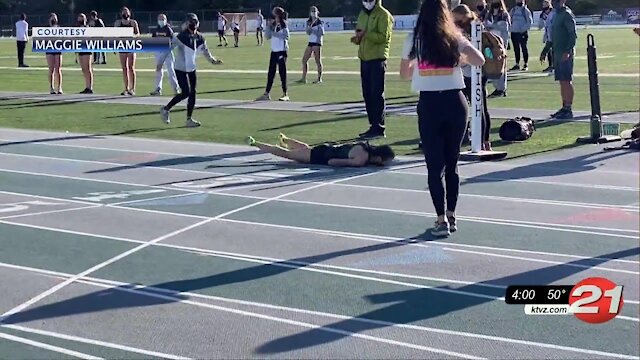Table of contents
Debunking COVID-19 Myths: Unmasking the Truth
In a world grappling with a relentless pandemic, questions and concerns surrounding COVID-19 measures have become increasingly perplexing and contentious. As we navigate through this uncertain terrain, it is essential to analyze various facets of our response, from mask-wearing during outdoor activities to vaccine opinions and the effectiveness of these measures. This article delves deep into these topics and aims to burst the bubble of confusion, providing clarity and context for our readers.
Mask-Wearing and Outdoor Activities
The Tale of Maggie Williams
Our journey begins with the unfortunate story of Maggie Williams, a passionate runner who participated in a local race. Maggie, a symbol of determination and perseverance, tragically fell during the race while wearing a mask. Her story ignited a debate about the necessity of wearing masks during outdoor activities. Critics argue that such mandates may jeopardize individuals’ safety, especially when engaged in strenuous physical activities like running.
Protests Against Mask Mandates
As mandates regarding mask-wearing extended to outdoor settings, protests erupted across the nation. Advocates for personal freedom argue that these mandates overreach into personal choices. This leads us to question whether blanket rules for mask-wearing outdoors are truly necessary, or if a more nuanced approach is required.
Vaccine Opinions
Joe Rogan’s Controversial Statement
The controversy surrounding COVID-19 vaccines took an intriguing turn when popular podcaster Joe Rogan suggested that 21-year-olds may not need these vaccines. This statement underscores the skepticism regarding vaccine recommendations. Are these recommendations based solely on scientific evidence, or do political factors come into play?
The Role of Government Mandates
The power of government mandates in determining vaccine policies cannot be understated. This power dynamic raises concerns about individual autonomy and personal choices. Should the government have the authority to dictate what goes into our bodies, or should these decisions remain in the hands of informed individuals?
Mask Effectiveness
The Doubtful Effectiveness of Masks
The effectiveness of masks, especially in outdoor settings, is a contentious topic. Some experts and studies have raised doubts about their impact on preventing COVID-19 transmission. To illustrate this point, consider the permeability of masks. How much protection do they truly provide, and under what circumstances?
Data Analysis and Modeling
In the midst of this debate, it is crucial to acknowledge the role of data scientists and their ability to forecast COVID-19 trends accurately. The importance of data analysis and adherence to scientific principles cannot be overstated. Healthy skepticism and constructive engagement with critics are essential to arrive at well-informed conclusions.
Variants and International Comparisons
South Africa’s Experience with Variants
A look at South Africa’s experience with variant strains of the virus offers valuable insights. How do these variants impact transmission and vaccine effectiveness? Exploring this aspect helps us understand the evolving nature of the virus.
A Global Perspective
Comparing different countries and their responses to COVID-19 is enlightening. By doing so, we can glean insights into which strategies have been effective and which have faltered. India’s recent spike in cases serves as a stark reminder of the importance of contextualizing data.
Vaccination and Young People
Do Young, Healthy Individuals Need Vaccines?
The question of whether young and healthy individuals need COVID-19 vaccines persists. As discussions about potential vaccine passport programs gain traction, concerns about individual rights come to the forefront. What are the implications of these programs, and how should we balance public health with individual freedom?
Conclusion
In conclusion, navigating the complexities of COVID-19 requires an open mind and the consideration of diverse information sources. Public figures, like Joy Reid and Joe Biden, have faced criticism for inconsistent mask-wearing behavior. It is incumbent upon all of us to stay informed, exercise healthy skepticism, and engage in thoughtful discourse to find our way out of this pandemic.
FAQs
The necessity of masks during outdoor activities depends on various factors such as the local COVID-19 transmission rate, the density of people in the outdoor area, and the nature of the activity. In open, uncrowded spaces where physical distancing is possible, the risk of transmission is generally lower. However, it’s important to follow local health guidelines to make informed decisions about mask-wearing during outdoor activities.
COVID-19 vaccines have undergone rigorous clinical trials to demonstrate their safety and efficacy. Multiple studies have shown that these vaccines significantly reduce the risk of infection, severe illness, and death caused by COVID-19. Vaccination campaigns worldwide have contributed to the decline in cases and hospitalizations, providing strong scientific evidence of their effectiveness.
Variants of the SARS-CoV-2 virus can impact the pandemic in various ways. Some variants may be more transmissible or partially resistant to immunity from prior infections or vaccines. Monitoring and studying these variants is essential to adapt public health measures and vaccine strategies accordingly. Vaccination remains a critical tool in reducing the impact of variants and preventing severe illness.
The role of government mandates in vaccine policies is a complex and debated issue. While public health authorities may implement mandates to increase vaccine coverage and protect the population, it’s crucial to strike a balance between public health goals and individual rights. Policies should be informed by scientific evidence, transparent communication, and respect for personal autonomy.
Data analysis is of paramount importance in understanding and responding to COVID-19 trends. It helps identify patterns, assess the effectiveness of interventions, and make informed decisions. Data scientists and epidemiologists use modeling and analysis to forecast disease spread, plan healthcare resources, and guide public health measures. Engaging with data and science is essential for an effective pandemic response.
